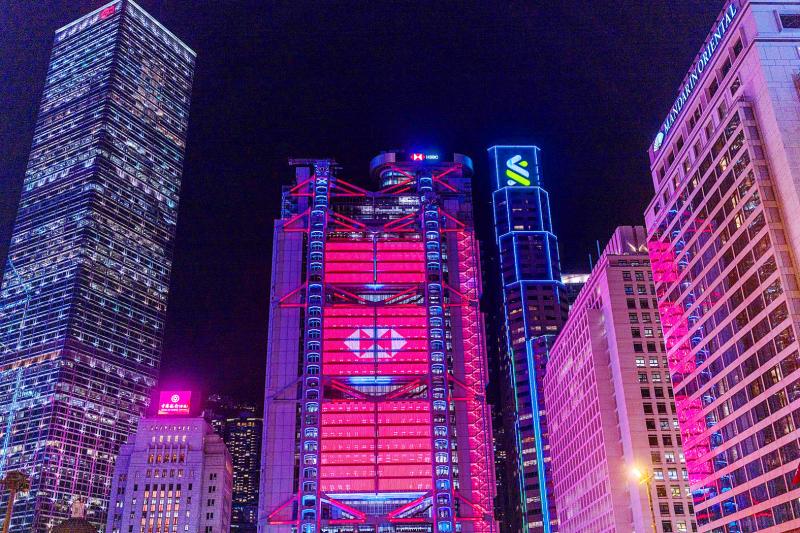HSBC Holdings PLC yesterday said pre-tax profit fell in the first half of this year, but that it intends to resume quarterly dividends next year as its annual outlook remained positive.
The firm said it made US$9.175 billion before tax, down more than 15 percent year-on-year.
Chief executive Noel Quinn said that “it reflected a more normalized level of expected credit losses compared with the COVID-19 releases made last year, as well as the macroeconomic impact of the Russia-Ukraine war.”

Photo: Bloomberg
The annual revenue outlook was positive, he said, as net interest income is expected to reach at least US$31 billion this year and US$37 billion next year as global interest rates rise.
Quinn said the group is confident of achieving its best returns in a decade next year.
“We also intend to revert to quarterly dividends in 2023,” he added.
London-headquartered HSBC was among a number of major banks to cancel their dividends early in the COVID-19 pandemic following a de facto order from the Bank of England — a move that upset some Hong Kong shareholders.
The plan to resume payouts came before HSBC executives are today to meet with Hong Kong shareholders face-to-face for the first time in three years. The executives are expected to field questions about a restructuring bid from its biggest shareholder Ping An Insurance Group Co (平安保險集團).
The lender is under pressure from Ping An, which has a 9.2 percent stake, to spin off its Asian operations in a bid to unlock shareholder value amid tensions between China and the West.
Quinn and chairman Mark Tucker have not publicly commented on Ping An’s campaign, but the bank has hinted that it wants to keep its current structure while continuing a pivot to Asia, Bloomberg reported.
Hong Kong politician Christine Fong (方國珊) on Sunday said that HSBC separating its Asian business and bringing back its primary listing to the territory is the “best way to protect [the interests of] minority shareholders.”
Fong, who reportedly represents 500 small investors in HSBC stock, also voiced support for Ping An getting seats on HSBC’s board, citing the canceled dividends in 2020 as a reason.
Last year, HSBC vowed to accelerate a multiyear pivot to Asia and the Middle East, with ambitions to lead Asia’s wealth management market.
The bank said that it would invest US$6 billion in Hong Kong, China and Singapore and hire more than 5,000 wealth advisers — while slashing 35,000 jobs and cutting its retail operations in the US and France.
HSBC has commissioned Goldman Sachs Group Inc and advisory firm Robey Warshaw LLP to rebuff Ping An’s campaign, according to Bloomberg.

Hon Hai Precision Industry Co (鴻海精密) yesterday said that its research institute has launched its first advanced artificial intelligence (AI) large language model (LLM) using traditional Chinese, with technology assistance from Nvidia Corp. Hon Hai, also known as Foxconn Technology Group (富士康科技集團), said the LLM, FoxBrain, is expected to improve its data analysis capabilities for smart manufacturing, and electric vehicle and smart city development. An LLM is a type of AI trained on vast amounts of text data and uses deep learning techniques, particularly neural networks, to process and generate language. They are essential for building and improving AI-powered servers. Nvidia provided assistance

GREAT SUCCESS: Republican Senator Todd Young expressed surprise at Trump’s comments and said he expects the administration to keep the program running US lawmakers who helped secure billions of dollars in subsidies for domestic semiconductor manufacturing rejected US President Donald Trump’s call to revoke the 2022 CHIPS and Science Act, signaling that any repeal effort in the US Congress would fall short. US Senate Minority Leader Chuck Schumer, who negotiated the law, on Wednesday said that Trump’s demand would fail, while a top Republican proponent, US Senator Todd Young, expressed surprise at the president’s comments and said he expects the administration to keep the program running. The CHIPS Act is “essential for America leading the world in tech, leading the world in AI [artificial

DOMESTIC SUPPLY: The probe comes as Donald Trump has called for the repeal of the US$52.7 billion CHIPS and Science Act, which the US Congress passed in 2022 The Office of the US Trade Representative is to hold a hearing tomorrow into older Chinese-made “legacy” semiconductors that could heap more US tariffs on chips from China that power everyday goods from cars to washing machines to telecoms equipment. The probe, which began during former US president Joe Biden’s tenure in December last year, aims to protect US and other semiconductor producers from China’s massive state-driven buildup of domestic chip supply. A 50 percent US tariff on Chinese semiconductors began on Jan. 1. Legacy chips use older manufacturing processes introduced more than a decade ago and are often far simpler than

Gasoline and diesel prices this week are to decrease NT$0.5 and NT$1 per liter respectively as international crude prices continued to fall last week, CPC Corp, Taiwan (CPC, 台灣中油) and Formosa Petrochemical Corp (台塑石化) said yesterday. Effective today, gasoline prices at CPC and Formosa stations are to decrease to NT$29.2, NT$30.7 and NT$32.7 per liter for 92, 95 and 98-octane unleaded gasoline respectively, while premium diesel is to cost NT$27.9 per liter at CPC stations and NT$27.7 at Formosa pumps, the companies said in separate statements. Global crude oil prices dropped last week after the eight OPEC+ members said they would